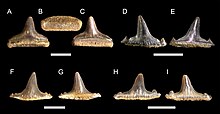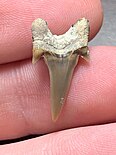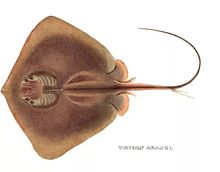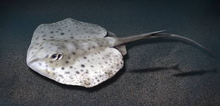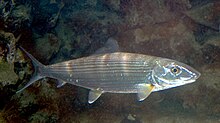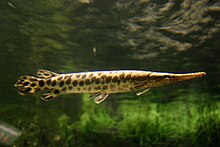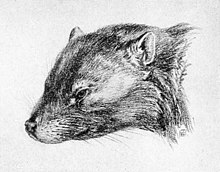From Wikipedia, the free encyclopedia
Geologic formation in North Carolina
The Bladen Formation is a geologic formation from the Late Cretaceous (middle Campanian ) of North Carolina and South Carolina , USA. It is known for a plethora of terrestrial and aquatic vertebrate fossils, including dinosaurs and mosasaurs .[ 1] Tuscaloosa Formation of Alabama .[ 2]
Unlike many other Cretaceous geologic formations from eastern North America, which were deposited in entirely marine environments, the Bladen Formation appears to have been deposited in a former river delta in an estuarine habitat, allowing for a mixture of freshwater, terrestrial, and marine fauna.[ 3] Bladen County landfill annex in Elizabethtown, North Carolina , which contains the richest known fauna from the formation.[ 4] [ 5] Quinby in Florence County, South Carolina , which also appears to have been deposited in a nonmarine environment with minor marine influence.[ 6]
It is deposited as a thin layer over the Tar Heel/Coachman Formation , which is often confused with. In North Carolina, it underlies the Maastrichtian -aged Peedee Formation , while in South Carolina it underlies the slightly younger Campanian-aged Donoho Creek Formation .[ 7]
Vertebrate paleobiota [ edit ] Based on Crane (2011), Schwimmer et al (2015) and the Paleobiology Database:[ 3] [ 6] [ 8]
Based on Crane (2011) and Case et al (2019):[ 3] [ 9]
The chondrichthyan biota closely resembles that of the Aguja Formation from Texas.[ 9]
Sharks of the Bladen Formation
Genus
Species
Location
Notes
Images
Archaeolamna A. kopingensis
Elizabethtown, NC
An archaeolamnid mackerel shark .
Cantioscyllium C. clementsi
Elizabethtown, NC
A nurse shark . Type locality of this species.
Cretalamna C. appendiculata
Elizabethtown, NC
A megatooth shark .
C. sp.
Cretorectolobus C. sp.
Elizabethtown, NC
A wobbegong .
Galeorhinus G. sp.
Elizabethtown, NC
A relative of the school shark .
Plicatoscyllium P. globidens
Elizabethtown, NC
A nurse shark.
Protolamna P. borodini
Elizabethtown, NC
An eoptolamnid mackerel shark.
Scapanorhynchus S. texanus
Elizabethtown, NC
A goblin shark .
Squalicorax S. kaupi
Elizabethtown, NC
A crow shark .
S. cf. S. pristodontus
Squatina S. sp.
Elizabethtown, NC
An angelshark . Sometimes assigned to the dubious species S. hassei .[ 9]
Rays of the Bladen Formation
Genus
Species
Location
Notes
Images
Anoxypristis A. sp.
Elizabethtown, NC
A sawfish .
Borodinopristis B. schwimmeri
Elizabethtown, NC
A sclerorhynchid sawskate . Type locality of B. shannoni .[ 10]
B. shannoni
Brachyrhizodus B. wichitaensis
Elizabethtown, NC
An eagle ray .
Dasyatis D. cf. commercensis Elizabethtown, NC
A stingray .
Ischyrhiza I. avonicola
Elizabethtown, NC
A sclerorhynchid sawskate.
I. mira
Onchopristis O. sp.
Elizabethtown, NC
An onchopristid sawskate.
Ptychotrygon P. triangularis
Elizabethtown, NC
A ptychotrygonid sawskate.
P. vermiculata
Protoplatyrhina P. sp.
Elizabethtown, NC
A hypsobatid ray.[ 11]
Pseudohypolophus P. ellipsis
Elizabethtown, NC
A guitarfish .
Rhinobatos R. casieri Elizabethtown, NC
A guitarfish.
Rhombodus R. binkhorsti
Elizabethtown, NC
A rhombodontid ray.
R. laevis
Schizorhiza S. sp.
Elizabethtown, NC
A schizorhizid sawskate.
Based on Brownstein (2018):[ 14]
^ Various Contributors to the NCSM, et al. 2020. "NCSM Collection: Paleontology Database."
^ "Geolex — Bladen publications" . ngmdb.usgs.gov . Retrieved 2024-11-13 .^ a b c Crane, Cynthia Danielle (2011). VERTEBRATE PALEONTOLOGY AND TAPHONOMY OF THE LATE CRETACEOUS (CAMPANIAN) BLADEN FORMATION, BLADEN COUNTY, NORTH CAROLINA ^ "PBDB Collection" . paleobiodb.org . Retrieved 2024-11-13 .^ Crane, Cynthia Danielle (2011). Vertebrate paleontology and taphonomy of the late Cretaceous (Campanian) Bladen Formation, Bladen County, North Carolina ^ a b Schwimmer, David R.; Sanders, Albert E.; Erickson, Bruce R.; Weems, Robert E. (2015). "A Late Cretaceous Dinosaur and Reptile Assemblage from South Carolina, Usa" . Transactions of the American Philosophical Society . 105 (2): i–157. ISSN 0065-9746 . ^ "Geolex — Bladen publications" . ngmdb.usgs.gov . Retrieved 2024-11-13 .^ "PBDB Collection" . paleobiodb.org . Retrieved 2024-11-15 .^ a b c Case, Gerald R.; Cook, Todd D.; Kightlinger, Taylor (2019-07-31). "A description of a middle Campanian euselachian assemblage from the Bladen Formation of North Carolina, USA" . Vertebrate Anatomy Morphology Palaeontology . 7 : 69–82. doi :10.18435/vamp29345 . ISSN 2292-1389 . ^ Case, Gerard R.; Cook, Todd D.; Wilson, Mark V.H.; Borodin, Paul D. (2012). "A new species of the sclerorhynchid sawfish Borodinopristis from the Campanian (Upper Cretaceous) of North Carolina, USA" . Historical Biology . 24 (6): 592–597. doi :10.1080/08912963.2012.663367 . ISSN 0891-2963 . ^ "Protoplatyrhina sp. | Shark-References" . shark-references.com . Retrieved 2024-11-15 .^ "PBDB Collection" . paleobiodb.org . Retrieved 2024-11-13 .^ Gardner, James D.; DeMar, David G. (2013-12-01). "Mesozoic and Palaeocene lissamphibian assemblages of North America: a comprehensive review" . Palaeobiodiversity and Palaeoenvironments . 93 (4): 459–515. doi :10.1007/s12549-013-0130-z . ISSN 1867-1608 . ^ Center~chasethedinosaur@gmail.com, Chase D. Brownstein~Stamford Museum & Nature (2018-02-08). "The biogeography and ecology of the Cretaceous non-avian dinosaurs of Appalachia" . Palaeontologia Electronica . Retrieved 2024-11-15 . ^ "PBDB Collection" . paleobiodb.org . Retrieved 2024-11-13 .

